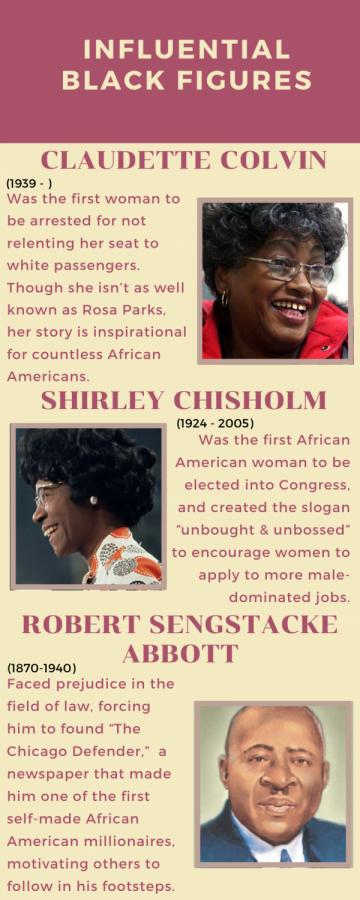Remembering lesser-known black figures for Black History Month
February 13, 2020
This February marks the 44th Black History Month, and many commemorate this occasion in a variety of ways. Some embrace the culture and heritage by supporting black businesses or attending rallies, while others read up on important issues affecting the community. Throughout this month, however, many remain unaware of some of history’s lesser-known influential black figures. Black History Month sheds light on forgotten figures in our nation’s history.
“Black history is part of American history, so we should be celebrating it every single day,” head librarian Robyn Singletary-Chung said. “It should be just part of the curriculum, but because it has not been or because it hasn’t been appreciated, it’s set out so that we pay some attention.”
An influential black figure can be anyone who has left an impact and encouraged others to strive for greatness.
“Without these people, a lot of us wouldn’t be in the position that we are today,” Black Student Association sponsor and counselor Dwayne Peyton said. “We wouldn’t be inspired [and] we wouldn’t have our heroes. We’ve got to give credit where credit’s due because these people, despite what the world said, they stood up and gave voice to all of us.”
Jabu Ndlovu, a notable South African woman, fought for feminist rights and for the safety of her country and people in 1985, a time of discrimination and disunity caused by their civil war. Her city was ravaged, and both she and her daughter were murdered for her outspokenness.
Similarly, Jesse Owens was an inspiring African American track-and-field athlete who won four gold medals in the 1936 Olympic Games in Berlin. Owen’s record was unrivaled for 25 years, and he received the Presidential Medal of Freedom posthumously.
Like Owen, Ava DuVernay is a well-known African American icon, though she reaches a more modern audience. She is a film director who has been nominated for multiple awards and directed “A Wrinkle In Time,” the most expensive movie ever directed by a black woman, with a cast composed of highly admired actresses, becoming an inspiration for all female filmmakers.
Many students believe that while Black History Month often shies away from more modern leaders, it helps to build a basic understanding of black history.
“I think it’s done an excellent job bridging the gap between what history classes actually teach us [and] what’s [happening today],” senior Ruby Carter-Ogden said.
Today, we’re becoming more inclusive as a country, encouraging more representation and appreciating different cultures. This can be found in the film industry, where movies pertaining to the lives of African Americans during the time of slavery have become more commonly released. Some better-known media would be “Harriet,’ “12 Years a Slave” and even a reboot of the TV mini series “Roots,” which aired on the History Channel. Stories like these that are spread through popular media allow for more awareness about black history.
“I especially admire the four African American women featured in the recent film ‘Hidden Figures,’” social studies teacher Antonette Bowman said. “They included Dorothy Vaughan, a computer programmer, and Katherine Johnson, a mathematician, as well as engineers Christine Darden and Mary Jackson. These brilliant and courageous African American women overcame significant obstacles related to racism and sexism and made pivotal contributions to America’s space program.”
One can never do too much when spreading awareness as there are countless opportunities to get involved, even at school, such as joining the Black Student Association or starting a club for another group who feels as if their voices have not been heard.
“African Americans have been undervalued and marginalized,” Singletary-Chung said. “That doesn’t change until we change our mindsets.”



